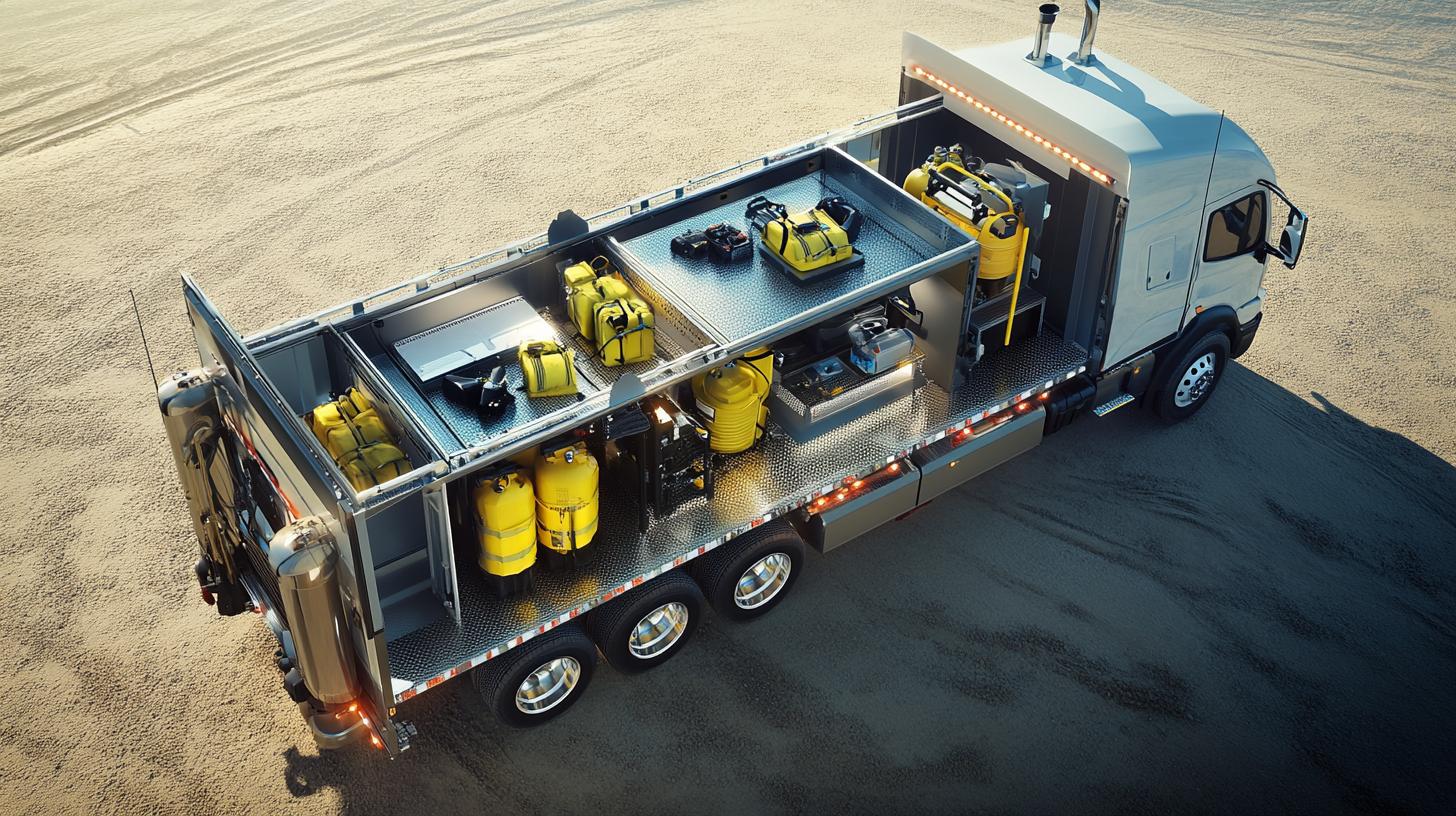Understanding the FMCSA Cargo Insurance Requirements for Motor Carriers
11.11.2024
Introduction to FMCSA Cargo Insurance Requirements
The Federal Motor Carrier Safety Administration (FMCSA) sets forth specific cargo insurance requirements for motor carriers operating in the United States. Understanding these requirements is crucial for motor carriers to ensure compliance with federal regulations and protect themselves in the event of cargo loss or damage.
Cargo insurance is a type of insurance that provides coverage for the goods being transported by a motor carrier . It is designed to protect against financial loss in case of theft, damage, or loss of cargo during transit. The FMCSA mandates that motor carriers must have a minimum level of cargo insurance coverage to operate legally.
The amount of cargo insurance required by the FMCSA varies depending on the type of cargo being transported and the size of the carrier . Motor carriers must obtain cargo insurance from a reputable insurance provider and maintain proof of insurance at all times. Failure to comply with FMCSA cargo insurance requirements can result in fines, penalties, and even the suspension of operating authority.

In addition to the minimum cargo insurance requirements , motor carriers should also consider purchasing additional insurance coverage to protect themselves from potential liabilities beyond the mandated limits . Understanding the FMCSA cargo insurance requirements is https://newjobs4you.com/blogs/trucking-documentation/carrier-insurance-requirements/ essential for motor carriers to operate safely, protect their business, and maintain compliance with federal regulations.
In the following sections, we will delve deeper into the specific FMCSA cargo insurance requirements for motor carriers, including the types of coverage needed, how to obtain insurance , and best practices for ensuring compliance.
Types of Cargo Insurance Coverage
When it comes to cargo insurance coverage for motor carriers, there are several types of policies available to protect against different risks and liabilities. Understanding these coverage options is crucial for motor carriers to ensure they have adequate protection for their cargo during transportation.



- Basic Cargo Insurance: Basic cargo insurance typically covers the minimum requirements set by the Federal Motor Carrier Safety Administration (FMCSA). This coverage provides protection against common risks such as theft, damage, and loss of cargo during transit.
- Comprehensive Cargo Insurance: Comprehensive cargo insurance offers broader coverage than basic policies and can protect against a wider range of risks. This type of coverage may include protection against natural disasters, accidents, and other unforeseen events that could damage or destroy the cargo.
- Perishable Cargo Insurance: For motor carriers transporting perishable goods such as food or pharmaceuticals, perishable cargo insurance is essential. This specialized coverage is designed to protect against spoilage, contamination, or other issues that could affect the quality and safety of perishable cargo.
- Hazardous Materials Insurance: Motor carriers transporting hazardous materials are required to have specific insurance coverage to protect against the unique risks associated with these goods. Hazardous materials insurance provides coverage for spills, leaks, and other incidents that could result in environmental damage or personal injury.
- Reefer Breakdown Insurance: For carriers using refrigerated trailers to transport temperature-sensitive cargo, reefer breakdown insurance is crucial. This coverage can help cover the costs of repairs or replacements in case of a breakdown of the refrigeration unit, which could lead to spoilage of the cargo.
By understanding the different types of cargo insurance coverage available, motor carriers can choose the policies that best suit their needs and provide comprehensive protection for their cargo.
Minimum Insurance Requirements for Motor Carriers
When operating as a motor carrier , it is crucial to understand and comply with the minimum insurance requirements set forth by the Federal Motor Carrier Safety Administration (FMCSA). These requirements are in place to ensure that motor carriers have adequate insurance coverage to protect themselves and others in the event of accidents, cargo loss, or damage.
The FMCSA mandates that motor carriers must have a minimum level of cargo insurance based on the type of commodities they transport . For general freight carriers , the minimum cargo insurance requirement is $100,000 per occurrence. However, for carriers transporting household goods, the minimum requirement is higher at $5,000 per vehicle and $10,000 per occurrence.



It is important for motor carriers to carefully review their insurance policies to ensure they meet or exceed the minimum requirements set by the FMCSA. Failure to maintain adequate insurance coverage can result in penalties, fines, or even the suspension of operating authority.
In addition to cargo insurance , motor carriers are also required to maintain liability insurance to cover bodily injury and property damage. The minimum liability insurance requirements vary depending on the type of goods being transported and the size of the vehicle.
By understanding and adhering to the FMCSA's minimum insurance requirements , motor carriers can protect themselves, their cargo , and the public while operating on the nation's roadways.

Consequences of Non-Compliance with FMCSA Cargo Insurance Requirements
Non-compliance with the Federal Motor Carrier Safety Administration (FMCSA) cargo insurance requirements can have serious consequences for motor carriers. Failure to adhere to these regulations can result in fines, penalties, and even the suspension or revocation of operating authority.
One of the primary consequences of non-compliance is the risk of financial liability. If a motor carrier does not have the required cargo insurance coverage and is involved in an accident or loss of cargo, they may be held personally responsible for the damages. This can lead to significant financial losses and potential bankruptcy for the carrier.
Additionally, non-compliance with FMCSA cargo insurance requirements can damage the carrier's reputation and credibility in the industry. Customers may be hesitant to work with carriers that do not meet regulatory standards, leading to a loss of business and revenue. This can have long-lasting effects on the carrier's ability to operate successfully in the transportation industry.




Furthermore, continued non-compliance with FMCSA cargo insurance requirements can result in increased scrutiny from regulatory authorities. This can lead to more frequent inspections, audits, and investigations, which can be time-consuming and costly for the carrier . In severe cases, repeated violations can lead to the suspension or revocation of the carrier's operating authority, effectively shutting down their business.
In conclusion, it is crucial for motor carriers to understand and comply with FMCSA cargo insurance requirements to avoid the negative consequences associated with non-compliance. By maintaining the necessary insurance coverage and following regulatory guidelines , carriers can protect themselves from financial, reputational, and operational risks.
Tips for Ensuring Compliance with FMCSA Cargo Insurance Regulations
Ensuring compliance with FMCSA cargo insurance regulations is crucial for motor carriers to operate legally and protect their business interests. Here are some key tips to help motor carriers navigate the requirements effectively:
- Understand the Minimum Insurance Requirements: Motor carriers must maintain a minimum level of cargo insurance as mandated by the FMCSA. It is essential to familiarize yourself with these requirements and ensure that your insurance coverage meets or exceeds the specified limits.
- Work with Reputable Insurance Providers: When selecting an insurance provider, opt for reputable companies that specialize in cargo insurance for motor carriers. Verify that the provider is licensed and has a good track record of fulfilling claims promptly.
- Review Insurance Policies Regularly: Periodically review your insurance policies to ensure they are up to date and provide adequate coverage for your operations. Any changes in your business, such as fleet expansion or new routes, should be reflected in your insurance policy.
- Maintain Proper Documentation: Keep detailed records of your insurance policies, including policy numbers, coverage limits, and expiration dates. This documentation should be readily accessible for inspections and audits by FMCSA officials.
- Train Employees on Insurance Compliance: Educate your employees, especially those involved in handling cargo, about the importance of insurance compliance. Ensure they understand the procedures for filing claims and reporting any incidents that may affect insurance coverage.
- Monitor Compliance Continuously: Implement a system to monitor compliance with FMCSA cargo insurance regulations on an ongoing basis. Regularly check that all vehicles are properly insured and that insurance documentation is current and valid.
By following these tips, motor carriers can maintain compliance with FMCSA cargo insurance regulations and protect their business from potential liabilities.
Conclusion
In conclusion, understanding the FMCSA cargo insurance requirements is crucial for motor carriers to ensure compliance with federal regulations and protect their businesses. By maintaining the appropriate levels of cargo insurance coverage, motor carriers can safeguard themselves against potential financial losses in the event of accidents, theft, or damage to cargo during transportation.
It is essential for motor carriers to carefully review and assess their cargo insurance needs, taking into account the types of goods they transport , the value of the cargo , and the specific requirements outlined by the FMCSA. By working closely with insurance providers and staying informed about any changes in regulations, motor carriers can proactively manage their risk exposure and maintain a strong financial footing.
Overall, compliance with FMCSA cargo insurance requirements not only helps motor carriers meet legal obligations but also demonstrates their commitment to safety and professionalism in the transportation industry. By prioritizing cargo insurance compliance, motor carriers can build trust with customers, protect their reputation , and ensure the long-term success of their businesses.


Holiday Accommodation in Mildura
– Outdoor Swimming Pool

Holiday Accommodation Mildura
– Tennis Courts

Holiday Accommodation Mildura
– BBQ Facilities, Upgraded Gazebo

Holiday Resort Mildura
– Extensive garden works








